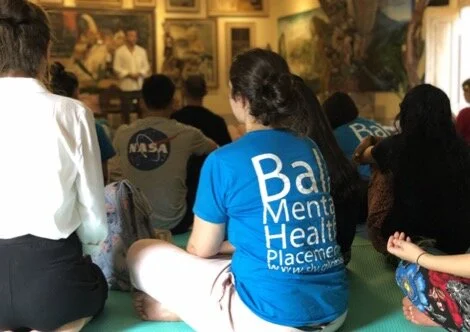Positive news you may have missed during the coronavirus
Absorbing negative news can have a damaging impact on our mental health- especially if we are choosing to rely on non-trustworthy sources. Reports of an increase in feelings of stress and anxiety since the beginning of the Coronavirus are rife, with Graham Davey, Professor of Psychology at the University of Sussex suggesting that when negative events such as a pandemic are presented visually and emotively they can ‘trigger acute stress reactions and even post-traumatic stress symptoms in vulnerable news consumers.’[1]
Is there a right way to manage my worrying around COVID-19?
Following government guidance, keeping on top of personal hygiene and protecting the most vulnerable aside, it can be tricky to know how to handle the current Coronavirus situation. It is likely, however much you tell yourself ‘not to worry’, that you will be, and it is perfectly ok to do so.
5 Tips to Practice Gratitude Daily
In trying situations or troubling times, it can be difficult to focus on the positives. Right now as the global impact of COVID-19 is felt, our disrupted way of life may feel unsettling. For many, these are uncertain times- whether that be health-wise, financially or for those separated from loved ones with no real sense of when the situation will change. If you are experiencing these feelings, one of the best actions you can take expressing gratitude for what you do have- not focus on what you don’t. A life well-lived is one of gratitude and thankfulness, whatever the circumstances.
What Can I Be Listening To During Self-Isolation?
Unfortunately, COVID-19 seems to be impacting our lives more and more: much of the world has gone into lockdown, with strict border restrictions and government-led policies in place imposing self-isolation. It can be difficult to cope with a disrupted routine and think of positive ways to fill time when you are confined indoors.
Tips to manage your mental health during self-isolation/social distancing
With the current global situation, words like ‘pandemic’ ‘crisis’ and ‘self-isolation’ can spread anxiety and fear, as well as confusion on the best course of action to take. Although it is essential to follow government guidelines to help prevent the spread coronavirus, it is also paramount that we take care of our mental health at this difficult time.
What preparations should I be taking for Coronavirus?
There is so much information circulating about the coronavirus it is hard to know where to begin. Reports of stockpiling items such as toilet roll and hand sanitizer continue as more and more cases are found worldwide. Whilst there is undoubtedly an element of concern as this escalates into a global pandemic, there are simple precautions you and your loved ones can take to stay safe from the virus.
Five top tips for coping with panic attacks
Next week (March 9th) is ‘World Panic Day’- a day aiming to highlight how this overwhelming feeling of anxiety can lead to sad, difficult and frightening thoughts and why it is so important to support people in staying calm during stressful situations. Yet, modern days lives can make it extremely difficult to remain calm even when suppressed emotions cause major freak outs and in some cases, nervous breakdowns.
What are the telltale signs of an eating disorder?
A stereotypical image of somebody struggling with an eating disorder is a thin, teenage girl battling anorexia. Yet, the truth is eating disorders come in all shapes, sizes and genders, and it isn’t always possible to tell if someone is struggling with one just on appearance alone.
Try These Things To Help Someone Experiencing Depression
The truth is depression is a complicated process. It is a mental health condition that affects the way a person feels about themselves, the way they think as well as the way they sleep and eat. It is often misused in daily language as we aren’t able to physically see a person is struggling, but there is a clear difference between sadness and depression.
Spiritual experiences in Bali
When visiting Bali, there are plenty of opportunities to discover spirituality and connect on a deeper level. Here are some of the top ways to experience this kind of healing energy and gain a deeper sense of self improvement.
What Negative Effects Does Stress Have On Our Body?
Stress can cause you to feel overwhelmed, frantic and sometimes on the verge of tears. But new findings have found that stress is more dangerous than that: it can actually cause serious havoc on our body.
5 tips to get a better night sleep
A new study has revealed that as we age, our circadian rhythm shifts and we feel tired later. So whereas young children need around 11-13 hours of rest a night, teenagers require around nine hours of sleep compared to when we reach adulthood and need about 8.[1]
Exercise to boost your mental health
We all know it is good to move our bodies, for both fitness and mental health. Whilst the effects on keeping active are often evident on our physical bodies- weight loss, toning, reduced blood pressure, a reduction in symptoms such as asthma, etc. Less evident is the effect exercise has on our mental health.
5 ways to protect your mental health after a relationship breakdown
Have you seen the Netflix film ‘A Marriage Story’ yet? The Oscar-nominated film describes itself as exploring how ‘a stage director and his actor wife struggle through a grueling, coast-to-coast divorce that pushes them to their personal and creative extremes’ [1] Praised by critics as presenting a very real take on the breakdown of a marriage, it portrays the struggles- both physical and emotional that are often attached to our personal relationships.
Have you tried Binaural beat therapy for anxiety and stress?
If you are somebody who is struggling with anxiety, stress or other related disorders it may be time to consider ‘binaural beat therapy’. A self-help treatment that is incredibly easy to do (you literally listen to a specialized audio through your headphones) it is a form of sound therapy which is making waves in the therapy world for all the right reasons.
But what does it actually entail and how can it help me? Read on to find out more…
5 changes to make in January for a great start to 2020
2020- a whole new decade! As we begin a new year it is a good time to evaluate our lives, draw a line under what has come before and set positive intentions going forward. Whilst setting resolutions is a good thing and can be a goal to work towards, setting the bar too high and being restrictive can lead to loss of willpower and an increase in anxiety. Many people use ‘January’ as a month to experiment with the changes they would like to make- not only does this help focus on the present rather than the end goal (making you more likely to succeed) but it enables change to be implemented gradually, letting your mind and body adapt.
Latest SLV workshop – practical aspects of CBT and Mindfulness
Recently Dr Jeremy Alford welcomed 50 psychology graduates from around the world who came as part of SLV global- a company providing students and graduates from around the world the opportunity to gain valuable, practical psychology work experience – to Ubud Bali where he gave an informative talk on aspects of his work around mental health.


















